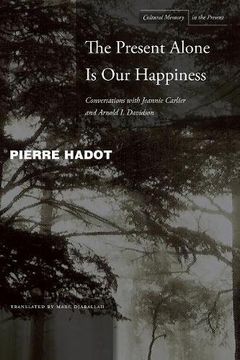Share
The Present Alone is our Happiness: Conversations With Jeannie Carlier and Arnold i. Davidson (Cultural Memory in the Present) (in English)
Arnold I. Davidson
(Author)
·
Pierre Hadot
(Author)
·
Jeannie Carlier
(Author)
·
Stanford University Press
· Paperback
The Present Alone is our Happiness: Conversations With Jeannie Carlier and Arnold i. Davidson (Cultural Memory in the Present) (in English) - Hadot, Pierre ; Carlier, Jeannie ; Davidson, Arnold I.
$ 22.40
$ 28.00
You save: $ 5.60
Choose the list to add your product or create one New List
✓ Product added successfully to the Wishlist.
Go to My WishlistsIt will be shipped from our warehouse between
Monday, June 03 and
Tuesday, June 04.
You will receive it anywhere in United States between 1 and 3 business days after shipment.
Synopsis "The Present Alone is our Happiness: Conversations With Jeannie Carlier and Arnold i. Davidson (Cultural Memory in the Present) (in English)"
In this book of brilliantly erudite and precise discussions, Pierre Hadot explains that for the Ancients philosophy was not reducible to the building of a theoretical system: it was above all a choice about how to live one's life. One of the most influential historians of ancient philosophy in the world today, Hadot is adept at using ancient philosophers to illuminate the relevance of their ideas to contemporary life. In this book, which is an ideal introduction to Hadot's more scholarly What is Ancient Philosophy?, we learn that to be an Epicurean is not merely to think like one; it is to adopt a way of living where limiting desires is the condition for happiness. Being an Aristotelian, similarly, is to choose a life that involves contemplation, and being a Cynic is to follow Diogenes in his refusal of quotidian convention and the mentality of ordinary people. If so many Ancient philosophers founded schools, Hadot explains, it was precisely because they were proposing how to live life on a daily basis. We learn here that the history of philosophy has been something more than just that of a discourse. The founding texts of Greek philosophy, after all, were notes taken from oral exercises undertaken in concrete circumstances and contexts, most often a dialogue between students and specific interlocutors who meant to shed light on their students' real existence. The immense contribution of this book, which also traces Hadot's own personal itinerary in a touching manner, is to remind us, through direct language and numerous examples, what the theoretical aspect of philosophy often masks: its vital and existential dimensions.

